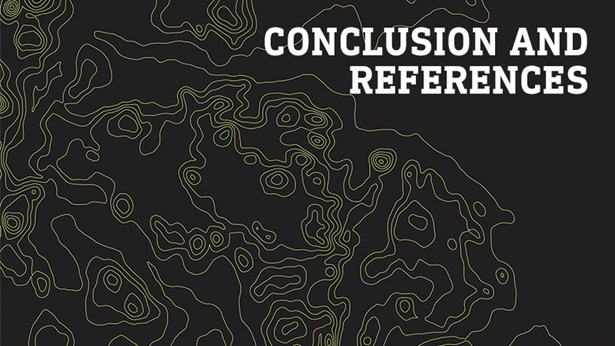
Inaugural Boston Climate Progress Report
Welcome to the first Boston Climate Progress Report. The report, to be updated every two years, examines Boston’s progress toward achieving net-zero emissions by 2050, our resilience to future climate disruptions, and the equity of our climate response. It also highlights a dozen key outcomes that must be achieved by programs, projects, and initiatives whose success is imperative to reaching the overarching goals, and lays out four “big lifts,” system-transforming actions which Boston—along with the broader region and state—needs to accelerate to sharply reduce net emissions.
This page walks you through the report chapter-by-chapter, or you can explore it online via Issuu. You can also download the report in its entirety in either single page view (better for printing) or two-page spreads (better for large screen viewing).
Note to Readers...................... 3
List of Abbreviations............. 8
Overview of the Report....... 11
Progress on Goals................. 31
Achieving Outcomes........... 57
Boston’s Big Lifts................... 85
Conclusion............................ 133
Acknowledgments............. 139
References............................ 143
Authors
Joan Fitzgerald, Professor, Northeastern University
Michael J. Walsh, Decarbonization Researcher and Consultant
Editor
Sandy Kendall, Editorial Director, The Boston Foundation
Advisors
John Cleveland, Strategic Advisor
Amy Longsworth, Executive Director
Boston Green Ribbon Commission
Designer
Mel Isidor, Designer/Urbanist/Artist, Isidor Studio
Project Leads
Julia Howard, Communications & Public Affairs Officer
Keith Mahoney, Vice President of Communications & Public Affairs
The Boston Foundation
Dear Reader,
A century of work improving lives and strengthening communities in the city has given the Boston Foundation a platform for civic leadership that we embrace as central to our role in the community and region. In that role, we are proud to partner with individuals and institutions seeking to effect positive change—from donors to nonprofits to policymakers and others who care deeply about our common future. And nothing is more common to our shared existence than our environment and the climate affecting it.
While climate work has not been a priority of the Foundation, time and tides, literally, have brought climate challenges and their inherent equity issues into sharper focus, demanding our attention. The City of Boston, a national leader on this issue, has approached it from several angles, with admirable rigor and ambitious goals. Yet the odds of reaching these goals are long. What is holding us back? That is what this report explores.
The creation of this Inaugural Climate Progress Report was a journey. The concept evolved through discussion with our partners at the Green Ribbon Commission over several years—and three mayoral administrations. Two years ago, we formed an exploratory committee with academic and policy experts to define the project and issue a request for proposals. The research team undertook the thorough examination of a massive, overlapping, and sometimes amorphous array of data and sources—and in the midst of writing had to recalibrate to encompass the passage of major new federal and state climate legislation.
The resulting report largely tracks Boston’s progress toward its stated climate-related goals, but we all know climate honors no city limits. The City has done a lot and can do more, but work must proceed at all levels to combat the numerous systemic barriers to progress identified in these pages. This report looks at how our community can support and expand the City’s efforts and bring more institutions and individuals into the fold to accelerate the climate agenda and to track a course to a safe and just future. It will require an all-hands-on-deck approach, one that centers equity, and involves participants at every level in many roles, from household and community to industry and government. And—with a mayor elected on a platform emphasizing a Green New Deal for Boston—the time is now.
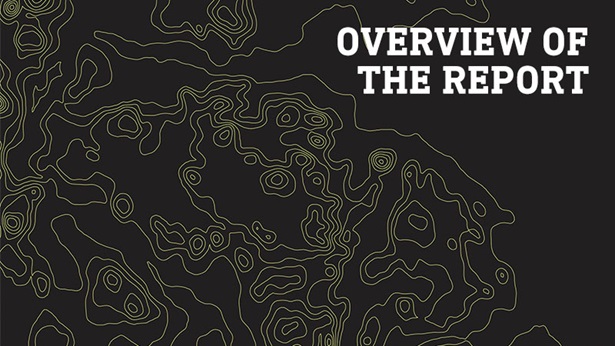
Introduction and Overview of the Report
The purpose of this report is to assess Boston’s progress toward achieving net-zero emissions and becoming resilient to future climate disruptions in an equitable manner. It has been six years since the publication of the Boston Research Advisory Group Report on Climate Change and Sea Level Rise Projections for Boston and four years since the publication of Carbon Free Boston. While the main findings from Boston’s reports remain relevant, our understanding of resilience needs and mitigation strategies has become much clearer. Thus, our assessment of progress asks: How well is Boston—as a civic community—driving forward system transformations to meet climate, resilience, and equity goals?
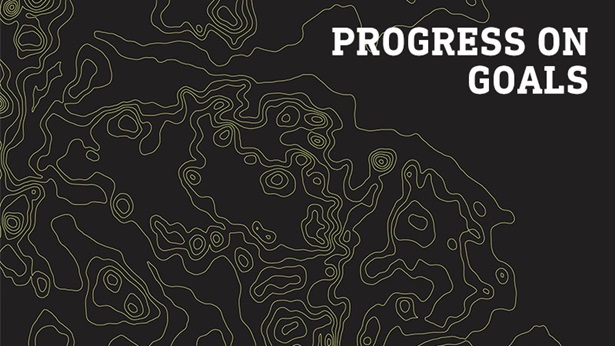
Progress on Goals
The next section of the report looks more closely at our collective progress toward commonly-accepted goals necessary to rise to the challenge of climate change. These goals include Boston's expressed goal to bring greenhouse gas emissions to net zero by 2050, to enhance resilience significantly, especially for communities of color that have had disproportionate exposure to environmental harm and economic disinvestment, and to ensure that environmental justice is prioritized in allocating the benefits of climate action initiatives. While city government can play a key role in advancing on these goals, it cannot do it alone. State and federal policy, the private sector, and even individual actions can all have critical impact on Boston's progress.
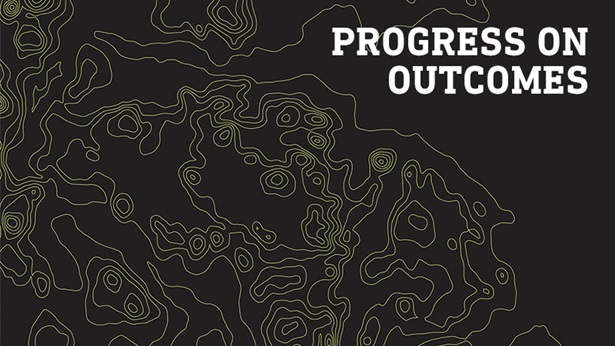
Progress on Outcomes
To eliminate emissions, build durable resilience, and achieve climate justice, we must transform a broad set of deeply ingrained energy, infrastructure, and human systems. To that end, the report highlights 12 outcomes that are considered necessary to make progress toward the climate goals. Many of the outcomes touch on two or all three goals. The intention in this section is to advance the conversation by expanding understanding of each outcome and where we stand, rather than to grade any single entity on progress. Click below to jump to the section, or click on the labels for each individual outcome to see that specific summary (opens in a new window).
Explore the sectionBoston must generate and be supplied with electricity sourced from renewable and other low-carbon generation resources.
Phase out the use of non–zero emissions vehicles and deploy accessible charging infrastructure.
Build more housing near transit and within the urban core. Accelerate strategies to reduce vehicle reliance and ownership by growing alternative travel modes and reshaping the street to prioritize the needs of people over vehicles.
Electrify buildings while updating them for energy efficiency, comfort, and resilience.
The utility-owned electric distribution grid must be modernized to support electrification, share the solar power generated on its roofs, and ensure resilience. Simultaneously, developing and sharing alternative thermal energy resources—such as the earth, water bodies, and waste heat—can efficiently displace fossil-fuel heating.
Fossil fuel use must drastically decline by 2050; however, modest judicious use of fossil or alternative fuels (e.g., bioenergy) will be needed to support low-cost reliability and resilience.
The amount of waste produced needs to decline even as we shift to more sustainable waste treatment practices. These practices include locally-sited material and energy recovery processes such as composting and technologies that convert organic waste to gas, electricity, or liquid fuels.
Appropriately support the scaling of carbon dioxide removal (CDR) technologies to extract carbon from the atmosphere and permanently store it in geologic or natural stocks.
Boston must better manage its trees and natural spaces to ensure they grow and provide enhanced benefits to their communities in a changing climate.
Maintain ongoing implementation of coastal resilience strategies across Boston’s and the region’s coastline to reduce the risk of coastal and riverine flooding, with the aim of protecting all neighborhoods.
Prepare the infrastructure systems that support life in Boston for future climate conditions and create new resilient systems. These include stormwater, energy, transportation, and emergency support systems in both public and private spaces.
Act with an acknowledgment that frontline communities have experienced a history of discriminatory practices, neglect, and outright damage.
Boston's 'Big Lifts' to Address Climate

Our collective response to climate change will require more than just discrete or incremental projects. The report highlights four "big lifts," multidecade, multi-platform projects that would play critical roles in helping the city align with its climate and equity goals. These projects are not the only paths, but they represent the kind of well-funded, coordinated public and private sector partnerships that can make significant impact in our energy consumption and efficiency, our climate resiliency and the equitable protection of all people in the city and region from climate-related challenges. Click on *explore the section* for a higher-level overview, or go to each big lift to explore the full chapter on each - or go even more in-depth in our supplemental reports.
Explore the Section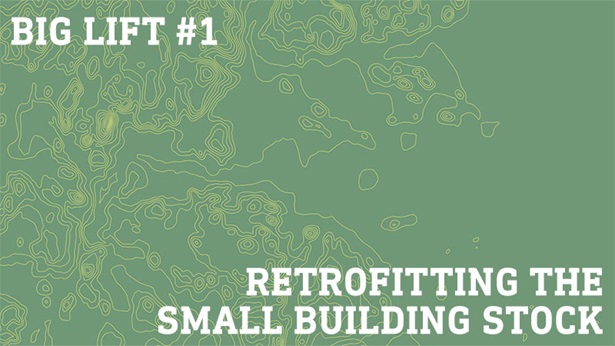
Retrofitting Small Building Stock
70,000 single- and small multifamily homes need to electrified by a new industry, powered by a workforce that represents the communities it serves.
What would it take?
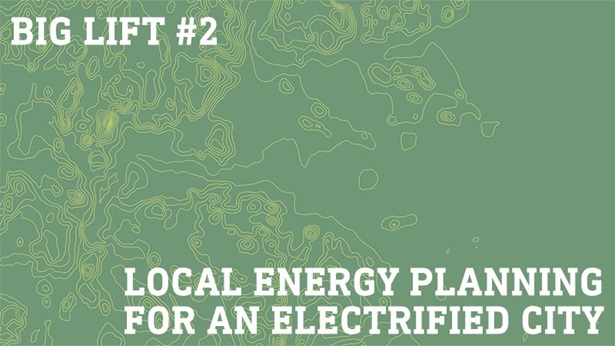
Local Energy Planning for an Electrified City
Energy planning must be rapidly modernized to meet the increasingly local needs of the energy transition and the communities that host energy infrastructure.
What would it take?
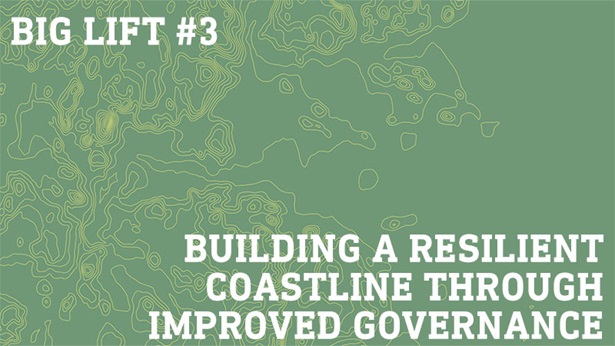
Building a Resilient Coastline
Boston needs to be part of the decision-making process and creation of a governance structure for managing the Massachusetts coastline.
What would it take?
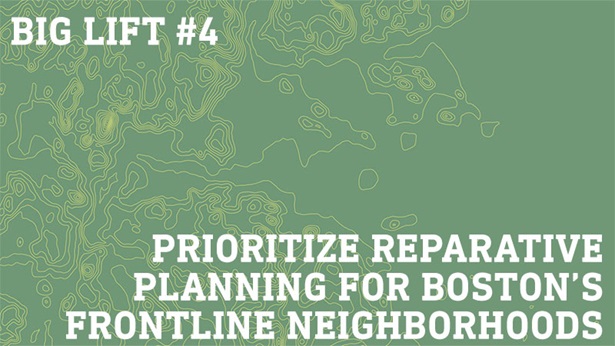
Prioritizing Reparative Planning
Boston must run with its “Green New Deal” vision to integrate climate action with reparative planning (and become a national leader in the process).
What would it take?
